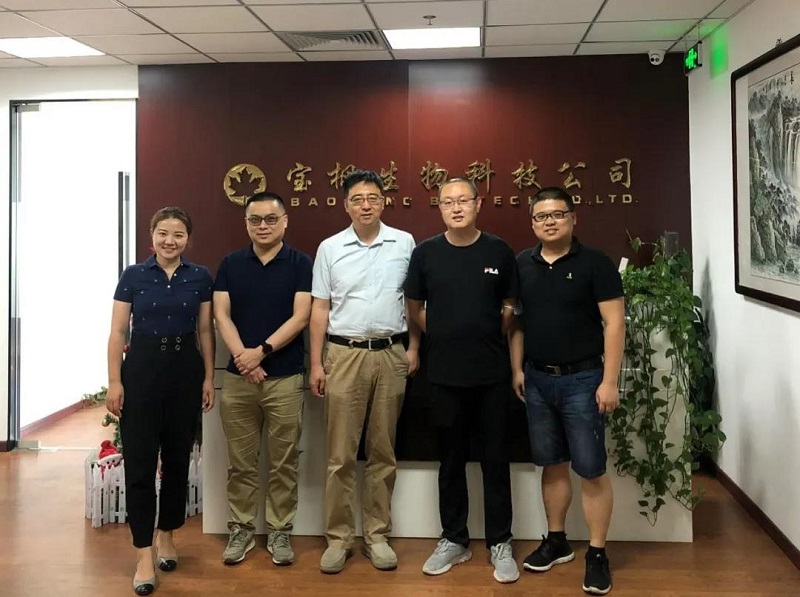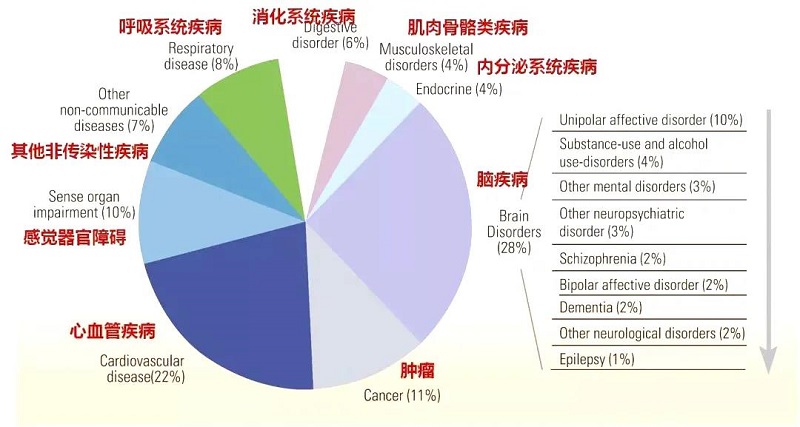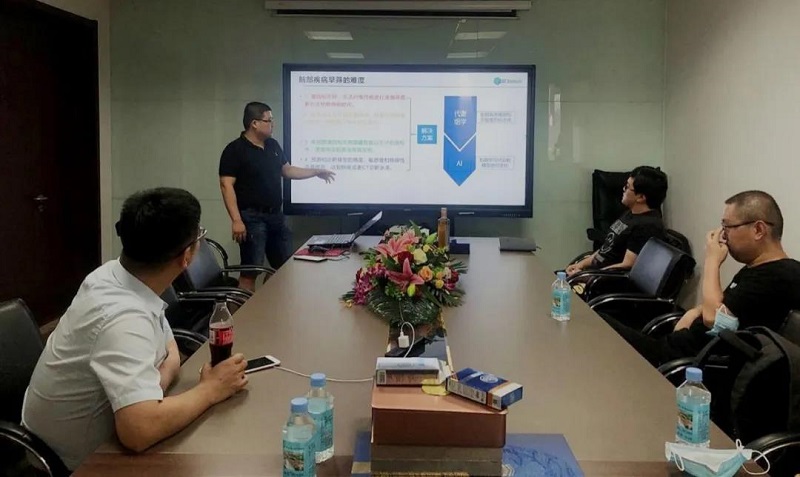On June 12, 2020, Qin Haiqiang, Deputy Director of Neurology Center of Beijing Tiantan Hospital, Jiang Nan, Deputy Director of surgery of the first affiliated Hospital of Tsinghua University, and Lin Feng, Deputy Director of Department of Neurology, the first Central Hospital of Sanming City, Fujian Province, exchanged and discussed with Dr. Chen Xianyang, biological CTO of Baofeng, on the clinical application of nervonic acid, the platform of metabolism + AI analysis software, and the development of 5G + new medical infrastructure.

Ms. Chang Tingting, Baofeng Biological CEO (1st left), Dr. Chen Xianyang, Baofeng Biological CTO (1st right), Deputy Director Qin Haiqiang, Neurology Center, Temple of Heaven Hospital, Beijing (2nd right), Deputy Director Jiang Nan, Huaxin Hospital, Beijing (1st Affiliated Hospital of Tsinghua University), Deputy Director Lin Feng, Department of Neurology, First Central Hospital, Sanming City (2nd left)
First of all, Dr. Chen introduced in detail the development history of Baofeng Biotechnology (Beijing) Co., Ltd., as well as the honors and related achievements received by the company. Studies at home and abroad have shown that nervonic acid is the core natural component of brain nerve cells and nerve tissue, and it is a special substance found so far in the world that can promote the repair and regeneration of damaged nerve fiber tissue. Nerve acid can induce self-growth and division of nerve fibers and repair blocked, twisted, condensed and broken nerve fibers. As the source of myelin sheath of nervous system, nervonic acid is an important component of white matter, which is used to form myelin membrane and is an important raw material for the formation of myelin sheath. Problems caused by white matter lesions: cognitive decline, stroke, dementia, motor disorders, brain atrophy, cerebrovascular disease, stroke, sensory disorders, mental disorders, sleep disorders and so on.

With the development of society, the number of people aged over 60 in China has reached 249 million. The prevalence of white matter lesions (including Alzheimer's disease, brain atrophy and other diseases) in the elderly in China is as high as 49.7%. The prevalence rate increases with age, and the prevalence rate of people over 80 years old is almost 100%. Therefore, early screening and early intervention become a rigid demand. With the development of precision medicine, people pay more and more attention to personalized treatment. Accurate treatment driven by big data is the foundation of medicine in the future. In particular, medical data processing is not only the core technology of accurate medical care and intelligent diagnosis in the future, but also the cornerstone of the progress of medical level in our country. However, with the continuous development of medicine, statistics, biology and computer technology, the intersection of disciplines is becoming more and more complex, and it is becoming more and more difficult and challenging to deal with it. In particular, the study of big data, which is based on new research methods, requires not only the knowledge of traditional statistics, but also multivariate statistics, as well as new statistical analysis techniques including machine learning.

Metabonomics, as the latest system biology screening tool, can effectively improve the sensitivity of screening, while AI algorithm, from tens of thousands of indicators to find the best markers, and combined with clinical information for overall evaluation. Our metabonomics + AI technology platform can be used to evaluate the effectiveness of nervous system drugs through patients' clinical cases, drug history, genetic background, metabolites changes, and drug metabolic pathways; through the research, understanding, and model construction of the whole process.
Later, Dr. Chen introduced some of the projects currently under way, so that all parties have a preliminary understanding of the overall planning. All parties indicated that in the future cooperation, a series of studies on early screening of nervous system diseases and development of target drugs, pharmacodynamics research, screening of new markers, optimization of five prescriptions, intelligent diagnosis and auxiliary diagnosis, and prevention and epidemiology of non-disease could be carried out by means of metabolism + AI. This seminar lays an important foundation for the in-depth cooperation of all parties in the future, as well as the promotion and application of nervonic acid. Baofeng Biotechnology (Beijing) Co., Ltd. is a national high-tech and Zhongguancun high-tech enterprise focusing on the screening and intervention of nervous system diseases. The company uses cutting-edge biotechnology tools (genomics, metabonomics, microbiology analysis), big data (data mining and machine learning) and AI (artificial intelligence) technology to develop and produce nervonic acid-centered screening and intervention products to provide global customers with brain health solutions.
Baofeng Biotechnology (Beijing) Co., Ltd. is a biotechnology company specializing in R & D, production, sales and technical services of brain health products related to plant-derived nervonic acid and nervonic acid. Nervonic acid is an important combination of nerve cell membrane recognized by scientists all over the world. It is the main structure of the branched chain of compound lipids (gangliosides, brain glycosides, sphingomyelin, etc.). It provides important raw materials for normal nerve cell metabolism and repair. Nervonic acid is also a necessary nutrient for nerve cells, especially brain cells, optic nerve cells, and peripheral nerve growth, redevelopment and maintenance. Its lack will cause stroke sequelae, Alzheimer's disease, cerebral palsy, brain atrophy, memory loss, insomnia and forgetfulness and other diseases. Nervonic acid is a lifelong nutritional component of the brain. As people grow older, the nervous tissue of the brain will be damaged, and it is very difficult for the human body to produce nervonic acid. Therefore, as an essential nutrient for the brain, the in vitro uptake of nervonic acid is particularly important.



 Author:bfuers
Author:bfuers Time:2020-7-31 10:10:43
Time:2020-7-31 10:10:43 人已看
人已看